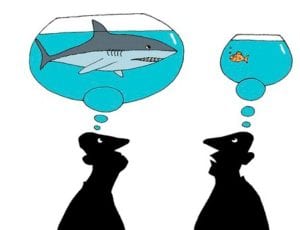 Shared situational awareness simply means two or more people have a commonly understood mental model – a mental image of what’s happening… [tweet this] and what is going to happen in the future. When responders arrive at the scene of an emergency at different times (which is common), there is a risk that each person arriving will have a different understanding of what is happening because the information (clues and cues) have changed.
Shared situational awareness simply means two or more people have a commonly understood mental model – a mental image of what’s happening… [tweet this] and what is going to happen in the future. When responders arrive at the scene of an emergency at different times (which is common), there is a risk that each person arriving will have a different understanding of what is happening because the information (clues and cues) have changed.
This can put responders at risk if they think they have a common understanding of what’s going on, when in reality, they don’t because the information has changed.

Think about a time when you may have arrived 10 minutes late after a movie started. Those who have been in the theater from the beginning have a different understanding of what’s going on than you do, because they benefited from capturing all of the clues and cues from the start. Unless you get a briefing, you are going to be at a disadvantage.
Chief Gasaway’s Advice
 An incident with one person defined as the commander who has watched the big picture incident (and all its changes from the start), in real-time, will likely have the best situational awareness. This person will also have a good understanding of the “speed” of the incident – a critical component to ensuring responder safety. The commander, or their designee, can provide progress and update reports for other responding units and provide critical information to responders as they arrive. It is very difficult to have shared situational awareness when newly-arriving responders think they know what’s going on when, when in fact, they are clueless (literally). [tweet this]
An incident with one person defined as the commander who has watched the big picture incident (and all its changes from the start), in real-time, will likely have the best situational awareness. This person will also have a good understanding of the “speed” of the incident – a critical component to ensuring responder safety. The commander, or their designee, can provide progress and update reports for other responding units and provide critical information to responders as they arrive. It is very difficult to have shared situational awareness when newly-arriving responders think they know what’s going on when, when in fact, they are clueless (literally). [tweet this]
Action Items
 1. How does your department ensure that all responders are on the same page when they arrive at different times?
1. How does your department ensure that all responders are on the same page when they arrive at different times?
2. What are the most critical pieces of information that responders need to know when they arrive that will improve their situational awareness?
3. What is at risk if responders arrive at different times and “assume” they know what’s going on, only to find out they were clueless?
_____________________________________________________________
The mission of Situational Awareness Matters is simple: Help first responders see the bad things coming… in time to change the outcome.
Safety begins with SA!
_____________________________________________________________
Share your comments on this article in the “Leave a Reply” box below. If you want to send me incident pictures, videos or have an idea you’d like me to research and write about, contact me. I really enjoy getting feedback and supportive messages from fellow first responders. It gives me the energy to work harder for you.
Thanks,

Email: Support@RichGasaway.com
Phone: 612-548-4424
Facebook Fan Page: www.facebook.com/SAMatters
Twitter: @SAMatters
LinkedIn: Rich Gasaway
YouTube: SAMattersTV
iTunes: SAMatters Radio
